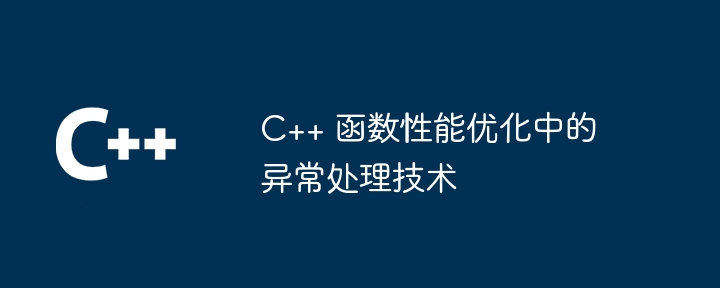
Exception handling technology in C function performance optimization: reducing exception throwing: input validation, resource management, error handling. Fine-grained catching and handling: use try-catch blocks and specific exception classes. Use exception handling libraries: The C standard library or third-party libraries provide more robust and efficient error handling.

Exception handling technology in C function performance optimization
Exception handling is a mechanism in C to handle runtime errors. But it may also have an impact on function performance. This article describes how to use exception handling techniques to optimize C function performance.
Minimize exception throwing
Exception throwing is an expensive operation because it requires saving stack information and performing unwind operations. Therefore, exceptions should be thrown as little as possible. Consider using the following techniques:
Catching and Handling Exceptions
If it is unavoidable to throw an exception, you should use a try-catch block to catch and Handle exceptions. Use specific exception classes for fine-grained catching to avoid catching all exceptions:
try {
// 业务逻辑
} catch (const std::invalid_argument& e) {
// 处理无效参数异常
} catch (const std::out_of_range& e) {
// 处理超出范围异常
}Use exception handling library
For complex or frequent exception handling, you can use the C standard library or a third-party exception handling library. These libraries provide more robust and efficient error handling. For example, the Boost.Exception library provides custom exception types, convenient error handling, and other advanced features.
Practical Case
Consider the following function, which parses a string and converts it to an integer:
int parse_int(const std::string& str) {
try {
return std::stoi(str);
} catch (const std::invalid_argument& e) {
throw std::invalid_argument("Invalid integer string.");
}
}By using input validation and fine-graining Exception catching, this function can handle invalid input efficiently without throwing a general exception. This improves function performance and provides better error handling.
Conclusion
By using exception handling techniques, programmers can optimize the performance of C functions while still maintaining reliability. Performance can be significantly improved by reducing exception throwing, using try-catch blocks, and leveraging exception handling libraries.
The above is the detailed content of Exception handling technology in C++ function performance optimization. For more information, please follow other related articles on the PHP Chinese website!
 What are the differences between c++ and c language
What are the differences between c++ and c language
 Recommended learning order for c++ and python
Recommended learning order for c++ and python
 Cost-effectiveness analysis of learning python and c++
Cost-effectiveness analysis of learning python and c++
 Is c language the same as c++?
Is c language the same as c++?
 Which is better to learn first, c language or c++?
Which is better to learn first, c language or c++?
 The difference and connection between c language and c++
The difference and connection between c language and c++
 C++ software Chinese change tutorial
C++ software Chinese change tutorial
 Cost-effectiveness analysis of learning python, java and c++
Cost-effectiveness analysis of learning python, java and c++




